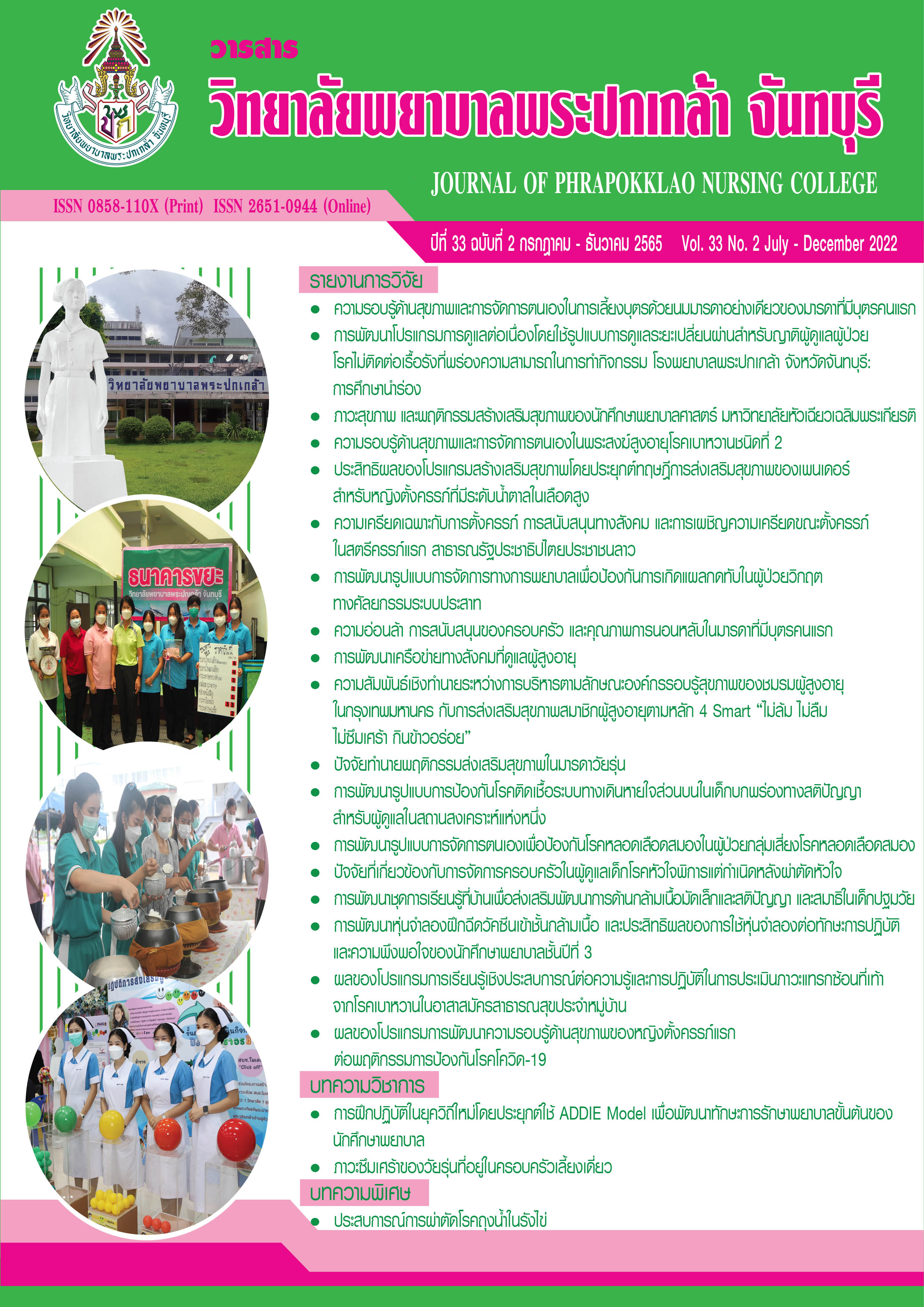การพัฒนาเครือข่ายทางสังคมที่ดูแลผู้สูงอายุ
คำสำคัญ:
ผู้สูงอายุ, ผู้ให้บริการ, เครือข่ายทางสังคม, การดูแลผู้สูงอายุบทคัดย่อ
การวิจัยครั้งนี้เป็นการวิจัยเชิงปฏิบัติการ เพื่อพัฒนาและประเมินผลการพัฒนาเครือข่ายทางสังคมที่ดูแลผู้สูงอายุ กลุ่มตัวอย่างประกอบด้วยผู้สูงอายุ จำนวน 150 คน และผู้ให้บริการ จำนวน 45 คน ในจังหวัดชลบุรี ฉะเชิงเทรา สระแก้ว จันทบุรี และตราด เครื่องมือการวิจัยประกอบด้วย แนวทางการสนทนากลุ่ม แบบสัมภาษณ์ข้อมูลทั่วไปของผู้สูงอายุ แบบสัมภาษณ์การรับรู้คุณค่าในตนเองของผู้สูงอายุ มีค่าความเชื่อมั่น .79 แบบสัมภาษณ์พฤติกรรมสุขภาพของผู้สูงอายุ มีค่าความเชื่อมั่น .72 แบบสัมภาษณ์ข้อมูลทั่วไปของผู้ให้บริการ แบบสัมภาษณ์การรับรู้คุณค่าในตนเองของผู้ให้บริการ มีค่าความเชื่อมั่น .96 และแบบสัมภาษณ์การรับรู้พลังอำนาจของผู้ให้บริการ มีค่าความเชื่อมั่น .90 ดำเนินการวิจัยและเก็บรวบรวมข้อมูลในช่วงเดือนกันยายน 2560 ถึงเดือนสิงหาคม 2562 วิเคราะห์ข้อมูลด้วยสถิติความถี่ ร้อยละ ค่าเฉลี่ย ส่วนเบี่ยงเบนมาตรฐาน paired t-test และวิธีการวิเคราะห์เนื้อหา
ผลการวิจัยพบว่า 1) เครือข่ายทางสังคมหลักในการดูแลผู้สูงอายุในทุกพื้นที่ศึกษา คือ โรงพยาบาลส่งเสริมสุขภาพตำบล อาสาสมัครสาธารณสุขประจำหมู่บ้าน องค์กรปกครองส่วนท้องถิ่น ชมรมผู้สูงอายุ และแกนนำชุมชน โดยมีกิจกรรมส่งเสริมสุขภาวะผู้สูงอายุทั้งทางกาย ทางจิต และทางสังคมและจิตวิญญาณ 2) การพัฒนาเครือข่ายทางสังคมที่ดูแลผู้สูงอายุโดยใช้กระบวนการเสริมสร้างพลังอำนาจ การสนับสนุนทางสังคม และการสร้างการมีส่วนร่วม ทำให้เกิดการแลกเปลี่ยนความรู้ ความคิดเห็น และประสบการณ์ ซึ่งทำให้ได้แนวทางการดำเนินงานของเครือข่ายทางสังคมที่ดูแลผู้สูงอายุที่เหมาะสมกับพื้นที่ และ 3) หลังการพัฒนา ผู้สูงอายุมีคะแนนเฉลี่ยการรับรู้คุณค่าในตนเอง และคะแนนเฉลี่ยพฤติกรรมสุขภาพ สูงกว่าก่อนการพัฒนาอย่างมีนัยสำคัญทางสถิติ (t = 70.083, p < .001 และ t = 75.330, p < .001 ตามลำดับ) และผู้ให้บริการมีคะแนนเฉลี่ยการรับรู้คุณค่าในตนเอง และคะแนนเฉลี่ยการรับรู้พลังอำนาจ สูงกว่าก่อนการพัฒนาอย่างมีนัยสำคัญทางสถิติ (t = 10.019, p < .001 และ t = 13.813, p < .001 ตามลำดับ)
จากการวิจัยครั้งนี้มีข้อเสนอแนะว่า หน่วยงานที่เกี่ยวข้องกับการดูแลผู้สูงอายุควรมีการติดตามและสนับสนุนการเชื่อมโยงเครือข่ายทางสังคมที่ดูแลผู้สูงอายุ เพื่อให้เกิดความร่วมมือในการดูแลผู้สูงอายุอย่างต่อเนื่อง
เอกสารอ้างอิง
กมลทิพย์ ทิพย์สังวาลย์, นิธิพงศ์ ศรีเบญจมาศ, และประจวบ แหลมหลัก. (2561). ผลโปรแกรมการพัฒนาสมรรถนะอาสาสมัครดูแลผู้สูงอายุในชุมชน. วารสารมนุษยศาสตร์และสังคมศาสตร์ บัณฑิตวิทยาลัย มหาวิทยาลัยราชภัฏพิบูลสงคราม, 12(1), 275–291.
กรมการปกครอง กระทรวงมหาดไทย. (2560). สถิติผู้สูงอายุของประเทศไทย 77 จังหวัด ณ วันที่ 31 ธันวาคม 2560. สืบค้นจาก http://www.dop.go.th/download/knowledge/th1533055363-125_1.pdf
กัตติกา ธนะขว้าง, จินตนา รัตนวิฑูรย์, และจามจุรีย์ ทนุรัตน์. (2554). การพัฒนาเครือข่ายเพื่อนช่วยเพื่อนและศักยภาพในการดูแลตนเองเพื่อการสูงวัยอย่างมีสุขภาวะของผู้สูงอายุในชุมชน. วารสารวิจัยระบบสาธารณสุข, 5(3), 381–391.
กุนนที พุ่มสงวน. (2557). การสร้างเสริมพลังอำนาจทางสุขภาพ: บทบาทที่สำคัญของพยาบาล. วารสารพยาบาลทหารบก, 15(3), 86–90.
กุลวดี โรจน์ไพศาลกิจ. (2561). สถานการณ์ด้านประชากรผู้สูงอายุของจังหวัดฉะเชิงเทราระหว่าง ปี พ.ศ. 2550–2559. วารสารสุขศึกษา, 41(1), 154–170.
กุลวดี โรจน์ไพศาลกิจ, และยุวดี รอดจากภัย. (2561). สุขภาวะผู้สูงอายุที่อาศัยอยู่ในเขตเมืองและเขตชนบทของประเทศไทย. วารสารสาธารณสุขมหาวิทยาลัยบูรพา, 13(1), 113–127.
กุลวดี โรจน์ไพศาลกิจ, และวรากร เกรียงไกรศักดา. (2560). การพัฒนาแนวทางการดำเนินงานของชุมชนในการพัฒนาสุขภาวะผู้สูงอายุ. วารสารสมาคมนักวิจัย, 22(1), 81–97.
ชนิดา เตชะปัน, สิวลี รัตนปัญญา, และสามารถ ใจเตี้ย. (2562). การเสริมสร้างพลังอำนาจในการดำเนินงานด้านสุขศึกษาชุมชนของอาสาสมัครสาธารณสุขประจำหมู่บ้าน เทศบาลตำบลป่าไผ่ อำเภอสันทราย จังหวัดเชียงใหม่. วารสารวิทยาลัยบัณฑิตเอเซีย, 9(1), 17–24.
นิภาพรรณ อธิคมานนท์. (2554). ผลของโปรแกรมส่งเสริมสุขภาพสำหรับผู้สูงอายุในชมรมผู้สูงอายุอำเภอบางปะหัน จังหวัดพระนครศรีอยุธยา (วิทยานิพนธ์ปริญญามหาบัณฑิต). ชลบุรี: มหาวิทยาลัยบูรพา.
ปิยนุช ภิญโย, กิตติภูมิ ภิญโย, สายสุดา จันหัวนา, วชิรศักดิ์ อภิพัฒฐ์กานต์, ธรณิศ สายวัฒน์, และอมรรัตน์ อัครเศรษสกุล. (2560). ประสิทธิผลของโปรแกรมเสริมสร้างความสามารถแห่งตนต่อความรู้ ทัศนคติ และพฤติกรรมการดูแลของอาสาสมัครสาธารณสุขประจำหมู่บ้านในการดูแลผู้สูงอายุระยะยาวในชุมชน จังหวัดขอนแก่น. วารสารพยาบาลสงขลานครินทร์, 37(3), 109–120.
พภัสสรณ์ วรภัทร์ถิระกุล. (2561). ปัญหาแรงงาน: เมื่อประเทศไทยเข้าสู่สังคมผู้สูงอายุอย่างสมบูรณ์. สืบค้นจาก https://www.western.ac.th/media/attachments/2017/12/06/7-.pdf
พลัฐวัษ วงษ์พิริยชัย, ชมภูนุช หุ่นนาค, ศิริพร แย้มนิล, และประภาส ปิ่นตบแต่ง. (2562). รูปแบบการอภิบาลในการจัดการทรัพยากรป่าชายเลน. วารสารสหศาสตร์, 19(1), 30–49.
ไพบูลย์ พงษ์แสงพันธ์, และยุวดี รอดจากภัย. (2557). การมีส่วนร่วมของชุมชนในการส่งเสริมสุขภาพผู้สูงอายุในภาคตะวันออกของประเทศไทย. วารสารสาธารณสุขมหาวิทยาลัยบูรพา, 9(2), 13–20.
มูลนิธิสถาบันวิจัยและพัฒนาผู้สูงอายุไทย. (2560). สถานการณ์ผู้สูงอายุไทย ประจำปี 2560. สืบค้นจาก https://thaitgri.org/?p=38607
วิภา เพ็งเสงี่ยม, พัชราภัณฑ์ ไชยสังข์, และปัญจภรณ์ ยะเกษม. (2558). ผลของโปรแกรมการเสริมสร้างพลังอำนาจต่อการรับรู้พลังอำนาจและการปฏิบัติการดูแลผู้สูงอายุภาวะสมองเสื่อมของอาสาสมัครสาธารณสุขประจำหมู่บ้าน. วารสารการพยาบาลและการศึกษา, 8(1), 152–165.
ศศิพัฒน์ ยอดเพชร. (2559). ‘ผู้ดูแล’ ผู้สูงอายุในครอบครัว. สืบค้นจาก http://thammapakorn.dop.go.th/wp-content/uploads/2016/02/A7.pdf
ศิลปสวย ระวีแสงสูรย์. (2559). แนวทางการพัฒนาคุณภาพการดูแลผู้สูงอายุของกรุงเทพมหานคร เพื่อรองรับสังคมผู้สูงอายุ. กรุงเทพฯ: วิทยาลัยป้องกันราชอาณาจักร.
Aksoydan, E., Aytar, A., Blazeviciene, A., van Bruchem-Visser, R. L., Vaskelyte, A., Mattace-Raso, F., … Kiziltan, G. (2019). Is training for informal caregivers and their older persons helpful? A systematic review. Archives of Gerontology and Geriatrics, 83, 66–74. doi:10.1016/j.archger.2019.02.006
Burt, R. S. (2000). The network structure of social capital. Research in Organizational Behavior, 22, 345–423. doi:10.1016/S0191-3085(00)22009-1
Charles, L., Brémault-Phillips, S., Parmar, J., Johnson, M., & Sacrey, L. A. (2017). Understanding how to support family caregivers of seniors with complex needs. Canadian Geriatrics Journal, 20(2), 75–84. doi:10.5770/cgj.20.252
Ebrahimi, B., Hosseini, M., & Rashedi, V. (2018). The relationship between social support and death anxiety among the elderly. Elderly Health Journal, 4(2), 37–42. Retrieved from https://applications.emro.who.int/imemrf/Elderly_Health_Journal/Elderly_Health_Journal_2018_4_2_37_42.pdf
Goldzweig, G., Baider, L., Andritsch, E., & Rottenberg, Y. (2016). Hope and social support in elderly patients with cancer and their partners: An actor-partner interdependence model. Future Oncology, 12(24), 2801–2809. doi:10.2217/fon-2016-0267
House, J. S. (1981). Work stress and social support. Reading, MA: Addison-Wesley.
Khavinson, V., Popovich, I., & Mikhailova, O. (2020). Towards realization of longer life. Acta Bio-medica, 91(3), e2020054. doi:10.23750/abm.v91i3.10079
Kuhirunyaratn, P., Pongpanich, S., Somrongthong, R., Love, E. J., & Chapman, R. S. (2007). Social support among elderly in Khon Kean Province, Thailand. The Southeast Asian Journal of Tropical Medicine and Public Health, 38(5), 936–946. Retrieved from https://pubmed.ncbi.nlm.nih.gov/18041315/
Lee, W. J., Kim, H. G., Kim, H., Yoo, S. R., Jang, S. E., & Oh, M. K. (2017). Tangible social support and cognitive decline in the elderly: The Korean longitudinal study of aging. Korean Journal of Family Practice, 7(3), 337–341. doi:10.21215/kjfp.2017.7.3.337
Li, H., Ji, Y., & Chen, T. (2014). The roles of different sources of social support on emotional well-being among Chinese elderly. PLoS One, 9(3), e90051. doi:10.1371/journal.pone.0090051
Marcelino, I., Laza, R., & Pereira, A. (2016). SSN: Senior social network for improving quality of life. International Journal of Distributed Sensor Networks, 12(7), 2150734–2150734. doi:10.1177/155014772150734
Minkler, M., Wallerstein, N., & Wilson, N. (1990). Improving health through community organization and community building. In K. Glanz, B. K. Rimer, & K. Viswanath (Eds.), Health behavior and health education: Theory, research, and practice (pp. 287–312). San Francisco, CA: Jossey-Bass.
Morelli, N., Barello, S., Mayan, M., & Graffigna, G. (2019). Supporting family caregiver engagement in the care of old persons living in hard to reach communities: A scoping review. Health and Social Care in the Community, 27(6), 1363–1374. doi:10.1111/hsc.12826
Najafi, M., & Baseri, A. (2018). Relationship of perceived social support and self-actualization with life expectancy in the elderly in Tehran. Journal of Education and Community Health, 4(4), 56–64. doi:10.21859/jech.4.4.56
Rath, T., & Panigrahi, D. (2017). Instrumental social support for the rural elderly: Study of a rural block of a costal district of Odisha. International Journal of Community Medicine and Public Health, 4(7), 2320–2326. doi:10.18203/2394-6040.ijcmph20172818
Sahin, D. S., Özer, Ö., & Yanardag, M. Z. (2019). Perceived social support, quality of life and satisfaction with life in elderly people. Educational Gerontology, 45(1), 69–77. doi:10.1080/03601277.2019.1585065
Wallerstein, N., & Bernstein, E. (1988). Empowerment education: Freire’s idea adapted to health education. Health Education Quarterly, 15(4), 379–394. doi:10.1177/109019818801500402
ดาวน์โหลด
เผยแพร่แล้ว
รูปแบบการอ้างอิง
ฉบับ
ประเภทบทความ
สัญญาอนุญาต
ลิขสิทธิ์ (c) 2022 วารสารวิทยาลัยพยาบาลพระปกเกล้า จันทบุรี

อนุญาตภายใต้เงื่อนไข Creative Commons Attribution-NonCommercial-NoDerivatives 4.0 International License.
เนื้อความ ข้อมูล และรายการอ้างอิงที่ผู้เขียนใช้ในการเขียนบทความเพื่อลงตีพิมพ์ในวารสารวิทยาลัยพยาบาลพระปกเกล้า จันทบุรี ถือเป็นความคิดเห็นและความรับผิดชอบของผู้เขียน คณะผู้จัดทำวารสารไม่จำเป็นต้องเห็นพ้องด้วยหรือร่วมรับผิดชอบ
บทความที่ได้รับการลงตีพิมพ์ในวารสารวิทยาลัยพยาบาลพระปกเกล้า จันทบุรี ถือเป็นลิขสิทธิ์ของวารสารวิทยาลัยพยาบาลพระปกเกล้า จันทบุรี หากหน่วยงานหรือบุคคลใดต้องการนำส่วนหนึ่งหรือทั้งหมดของบทความไปเผยแพร่ต่อเพื่อวัตถุประสงค์ใด ๆ จะต้องได้รับอนุญาตจากบรรณาธิการวารสารก่อน



